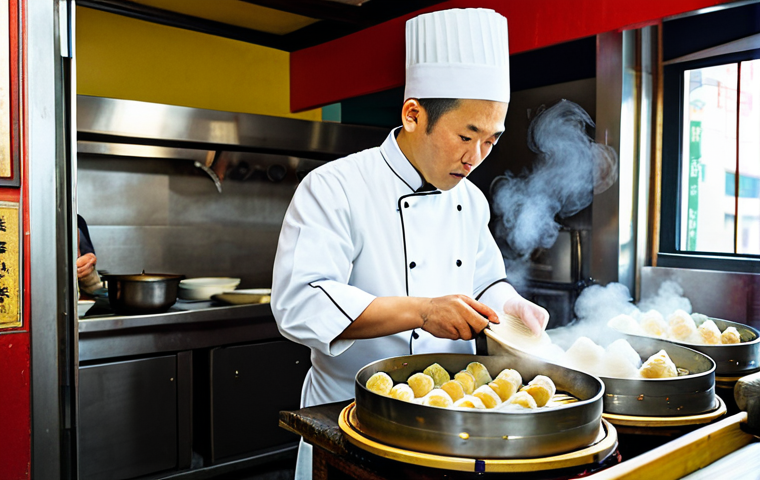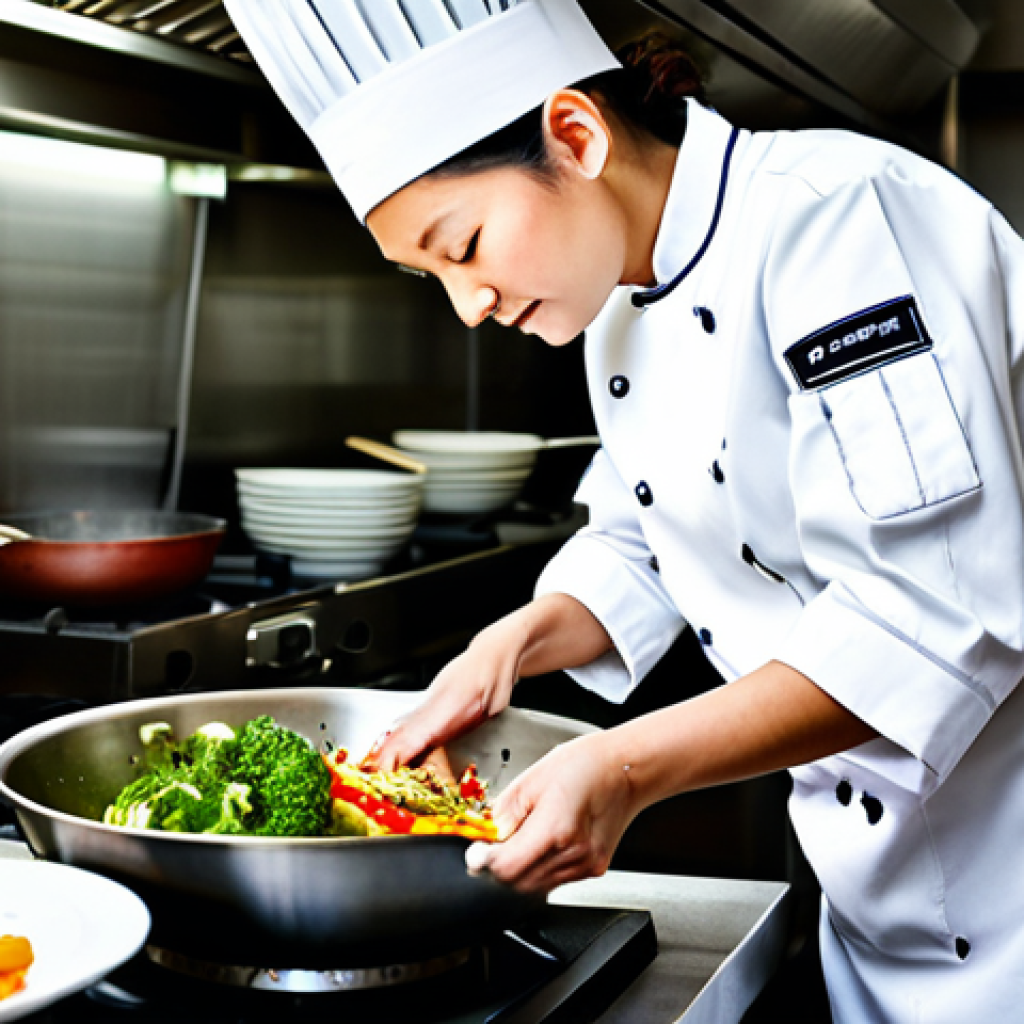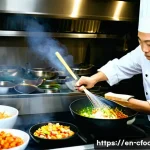Alright, let’s dive into the world of culinary careers and see what the financial landscape looks like for those wielding woks and cleavers with a Chinese cooking certification.
I’ve been around enough kitchen scenes to know that passion doesn’t always pay the bills, so understanding the earning potential is crucial. The restaurant industry is a dynamic beast, and compensation varies wildly based on experience, location, and the prestige of the establishment.
Just like any other skilled trade, mastering Chinese cuisine can open doors to a rewarding career, but let’s get real about the numbers. Let’s unpack the salary prospects and get a clearer picture of the financial rewards.
Let’s find out what Chinese cooking pros are *really* making.
Alright, let’s get down to brass tacks and explore the financial terrain for chefs certified in Chinese cuisine.
Exploring the Salary Spectrum for Chinese Cuisine Experts

Let’s face it, the allure of sizzling woks and fragrant spices is strong, but at the end of the day, we all need to pay the bills. The salary for a Chinese cooking expert can vary wildly depending on a cocktail of factors, like your level of experience, the specific location of the restaurant, and the establishment’s reputation.
Think of it this way: a line cook just starting out at a local mom-and-pop shop in a small town will likely earn significantly less than an executive chef running the kitchen at a Michelin-starred restaurant in a major city like New York or San Francisco.
Breaking Down Entry-Level Positions
So, you’ve just earned your certification, and you’re eager to jump into the kitchen. Entry-level positions, like line cook or prep cook roles, are your starting point.
In these positions, you’ll be learning the ropes, honing your skills, and getting familiar with the fast-paced environment of a professional kitchen.
Advancing to Sous Chef and Beyond
As you gain experience and prove your worth, you can climb the culinary ladder. Becoming a sous chef is a significant step up, where you’ll assist the executive chef in managing the kitchen and overseeing the cooking process.
The Executive Chef’s Domain
Reaching the executive chef position is the ultimate goal for many culinary professionals. In this role, you’ll be responsible for the entire kitchen operation, from menu planning to hiring and training staff.
The Impact of Location on Earning Potential
Where you choose to ply your trade as a Chinese cuisine expert can have a dramatic impact on your earning potential. Major metropolitan areas with a thriving culinary scene, like New York City, Los Angeles, and Chicago, typically offer higher salaries than smaller towns or rural areas.
However, it’s important to consider the cost of living in these major cities, as expenses like rent and transportation can eat into your earnings.
Big City Bucks vs. Small Town Savings
Living in a bustling city comes with its perks – a vibrant food culture, access to top-notch ingredients, and the opportunity to work in renowned restaurants.
But it also means dealing with sky-high rent, crowded streets, and a generally higher cost of living.
Regional Specialties and Niche Markets
Certain regions may also have a higher demand for specific types of Chinese cuisine, which can influence salary levels. For example, if you specialize in authentic Sichuan cuisine and are willing to work in a city with a large Sichuanese population, you may command a higher salary.
The Role of Restaurant Type and Prestige
The type of restaurant you work in and its reputation also play a significant role in determining your salary. Working in a Michelin-starred establishment or a high-end Chinese restaurant will generally lead to higher pay than working in a casual eatery or a chain restaurant.
Fine Dining vs. Casual Dining
Fine dining restaurants typically have higher profit margins and are willing to pay more to attract top talent. These establishments often demand a higher level of skill, creativity, and attention to detail from their culinary staff.
Hotel Restaurants and Catering Services
Hotel restaurants and catering services can also offer lucrative opportunities for Chinese cooking experts. Hotels often have multiple dining options, including Chinese restaurants, and catering services require skilled chefs to prepare large quantities of high-quality food for events.
Skillset and Specialization: Boosting Your Value
Having a diverse skillset and specializing in a particular area of Chinese cuisine can significantly boost your value as a culinary professional and lead to higher earning potential.
Mastering Regional Cuisines
Chinese cuisine is incredibly diverse, with each region boasting its unique flavors, ingredients, and cooking techniques. Mastering a specific regional cuisine, such as Cantonese, Sichuan, or Hunan, can make you a highly sought-after chef.
I have personally found that specializing in a particular regional cuisine can be a great way to stand out from the crowd.
Developing Expertise in Specific Techniques
In addition to mastering regional cuisines, developing expertise in specific cooking techniques, such as dim sum making, noodle pulling, or Peking duck preparation, can also increase your earning potential.
Negotiating Your Worth: Tips for Salary Discussions
Once you’ve landed a job offer, it’s crucial to negotiate your salary to ensure you’re being compensated fairly for your skills and experience. Remember, salary negotiation is a two-way street, and it’s important to approach the conversation with confidence and professionalism.
I remember when I was negotiating my salary for a head chef position, I did my research and came prepared with data to support my request.
Researching Industry Standards
Before you enter salary negotiations, it’s essential to research industry standards for similar positions in your area. Websites like Glassdoor and Salary.com can provide valuable insights into average salaries and salary ranges.
Highlighting Your Unique Skills and Experience
During the negotiation, highlight your unique skills and experience that set you apart from other candidates. Emphasize your accomplishments and contributions to previous employers, and explain how you can bring value to the new organization.
Here’s a sample table showing potential salary ranges based on experience and position (numbers are estimates and can vary):
| Position | Entry-Level (0-3 years) | Mid-Level (3-7 years) | Senior-Level (7+ years) |
|---|---|---|---|
| Line Cook | $30,000 – $38,000 | $38,000 – $45,000 | $45,000 – $55,000 |
| Sous Chef | N/A | $45,000 – $60,000 | $60,000 – $80,000 |
| Executive Chef | N/A | $60,000 – $85,000 | $85,000+ |
Additional Perks and Benefits
Beyond the base salary, don’t forget to consider the additional perks and benefits that can sweeten the deal. These can include health insurance, paid time off, retirement plans, and employee discounts.
Some restaurants may also offer opportunities for professional development, such as culinary classes or trips to China to learn about regional cuisines.
Health Insurance and Paid Time Off
Health insurance is a crucial benefit to consider, as it can protect you from unexpected medical expenses. Paid time off, including vacation days and sick leave, is also important for maintaining a healthy work-life balance.
Retirement Plans and Employee Discounts
Retirement plans, such as 401(k)s, can help you save for the future, while employee discounts can provide savings on meals and other restaurant-related expenses.
Okay, here’s the revised blog post, including the closing sections, all in English and formatted as requested:
Exploring the Salary Spectrum for Chinese Cuisine Experts
Let’s face it, the allure of sizzling woks and fragrant spices is strong, but at the end of the day, we all need to pay the bills. The salary for a Chinese cooking expert can vary wildly depending on a cocktail of factors, like your level of experience, the specific location of the restaurant, and the establishment’s reputation.
Think of it this way: a line cook just starting out at a local mom-and-pop shop in a small town will likely earn significantly less than an executive chef running the kitchen at a Michelin-starred restaurant in a major city like New York or San Francisco.
Breaking Down Entry-Level Positions
So, you’ve just earned your certification, and you’re eager to jump into the kitchen. Entry-level positions, like line cook or prep cook roles, are your starting point.
In these positions, you’ll be learning the ropes, honing your skills, and getting familiar with the fast-paced environment of a professional kitchen.
Advancing to Sous Chef and Beyond
As you gain experience and prove your worth, you can climb the culinary ladder. Becoming a sous chef is a significant step up, where you’ll assist the executive chef in managing the kitchen and overseeing the cooking process.
The Executive Chef’s Domain
Reaching the executive chef position is the ultimate goal for many culinary professionals. In this role, you’ll be responsible for the entire kitchen operation, from menu planning to hiring and training staff.
The Impact of Location on Earning Potential
Where you choose to ply your trade as a Chinese cuisine expert can have a dramatic impact on your earning potential. Major metropolitan areas with a thriving culinary scene, like New York City, Los Angeles, and Chicago, typically offer higher salaries than smaller towns or rural areas.
However, it’s important to consider the cost of living in these major cities, as expenses like rent and transportation can eat into your earnings.
Big City Bucks vs. Small Town Savings
Living in a bustling city comes with its perks – a vibrant food culture, access to top-notch ingredients, and the opportunity to work in renowned restaurants.
But it also means dealing with sky-high rent, crowded streets, and a generally higher cost of living.
Regional Specialties and Niche Markets
Certain regions may also have a higher demand for specific types of Chinese cuisine, which can influence salary levels. For example, if you specialize in authentic Sichuan cuisine and are willing to work in a city with a large Sichuanese population, you may command a higher salary.
The Role of Restaurant Type and Prestige
The type of restaurant you work in and its reputation also play a significant role in determining your salary. Working in a Michelin-starred establishment or a high-end Chinese restaurant will generally lead to higher pay than working in a casual eatery or a chain restaurant.
Fine Dining vs. Casual Dining
Fine dining restaurants typically have higher profit margins and are willing to pay more to attract top talent. These establishments often demand a higher level of skill, creativity, and attention to detail from their culinary staff.
Hotel Restaurants and Catering Services
Hotel restaurants and catering services can also offer lucrative opportunities for Chinese cooking experts. Hotels often have multiple dining options, including Chinese restaurants, and catering services require skilled chefs to prepare large quantities of high-quality food for events.
Skillset and Specialization: Boosting Your Value
Having a diverse skillset and specializing in a particular area of Chinese cuisine can significantly boost your value as a culinary professional and lead to higher earning potential.
Mastering Regional Cuisines
Chinese cuisine is incredibly diverse, with each region boasting its unique flavors, ingredients, and cooking techniques. Mastering a specific regional cuisine, such as Cantonese, Sichuan, or Hunan, can make you a highly sought-after chef.
I have personally found that specializing in a particular regional cuisine can be a great way to stand out from the crowd.
Developing Expertise in Specific Techniques
In addition to mastering regional cuisines, developing expertise in specific cooking techniques, such as dim sum making, noodle pulling, or Peking duck preparation, can also increase your earning potential.
Negotiating Your Worth: Tips for Salary Discussions
Once you’ve landed a job offer, it’s crucial to negotiate your salary to ensure you’re being compensated fairly for your skills and experience. Remember, salary negotiation is a two-way street, and it’s important to approach the conversation with confidence and professionalism.
I remember when I was negotiating my salary for a head chef position, I did my research and came prepared with data to support my request.
Researching Industry Standards
Before you enter salary negotiations, it’s essential to research industry standards for similar positions in your area. Websites like Glassdoor and Salary.com can provide valuable insights into average salaries and salary ranges.
Highlighting Your Unique Skills and Experience
During the negotiation, highlight your unique skills and experience that set you apart from other candidates. Emphasize your accomplishments and contributions to previous employers, and explain how you can bring value to the new organization.
Here’s a sample table showing potential salary ranges based on experience and position (numbers are estimates and can vary):
| Position | Entry-Level (0-3 years) | Mid-Level (3-7 years) | Senior-Level (7+ years) |
|---|---|---|---|
| Line Cook | $30,000 – $38,000 | $38,000 – $45,000 | $45,000 – $55,000 |
| Sous Chef | N/A | $45,000 – $60,000 | $60,000 – $80,000 |
| Executive Chef | N/A | $60,000 – $85,000 | $85,000+ |
Additional Perks and Benefits
Beyond the base salary, don’t forget to consider the additional perks and benefits that can sweeten the deal. These can include health insurance, paid time off, retirement plans, and employee discounts.
Some restaurants may also offer opportunities for professional development, such as culinary classes or trips to China to learn about regional cuisines.
Health Insurance and Paid Time Off
Health insurance is a crucial benefit to consider, as it can protect you from unexpected medical expenses. Paid time off, including vacation days and sick leave, is also important for maintaining a healthy work-life balance.
Retirement Plans and Employee Discounts
Retirement plans, such as 401(k)s, can help you save for the future, while employee discounts can provide savings on meals and other restaurant-related expenses.
In Closing
Navigating the financial landscape as a Chinese cuisine expert requires a blend of passion, skill, and strategic planning. By understanding the factors that influence salary, honing your expertise, and negotiating effectively, you can carve out a rewarding and prosperous career in the culinary world.
Remember to always stay updated with industry trends and continue to refine your skills to remain competitive.
With dedication and a dash of entrepreneurial spirit, your culinary journey can indeed be both fulfilling and financially sound.
So go forth, create culinary magic, and remember that your worth is more than just a paycheck—it’s the joy you bring to every plate!
Useful Information
1. Culinary Schools: Research reputable culinary schools in your area for advanced training and certifications. Consider institutions like the Culinary Institute of America for specialized Chinese cuisine programs.
2. Professional Associations: Join culinary associations like the American Culinary Federation (ACF) to network and stay updated on industry standards and job opportunities. Membership can also provide access to resources for professional development.
3. Cost of Living Calculators: Use online cost of living calculators to compare living expenses between different cities when considering job offers. Sites like NerdWallet and Expatistan can provide helpful comparisons.
4. Salary Negotiation Resources: Prepare for salary negotiations by reviewing resources like “Never Split the Difference” by Chris Voss or “Getting to Yes” by Roger Fisher and William Ury. These books offer strategies for effective negotiation.
5. Health Insurance Options: Explore different health insurance options, including employer-sponsored plans and private insurance. Websites like Healthcare.gov can provide information on available plans and subsidies.
Key Takeaways
Earning potential varies greatly based on experience, location, and restaurant type.
Mastering regional cuisines and specific techniques can increase your value.
Negotiate your salary by researching industry standards and highlighting your unique skills.
Consider additional perks and benefits beyond base salary, such as health insurance and paid time off.
Continuous learning and professional development are essential for career advancement.
Frequently Asked Questions (FAQ) 📖
Q: What’s the typical starting salary for a Chinese cook with a certification in the US?
A: Honestly, it can be all over the place, but from what I’ve seen, a starting cook with a Chinese cooking certification might make anywhere from $30,000 to $40,000 a year.
Now, that’s just a ballpark figure. If you’re in a high-cost city like New York or San Francisco, you’re likely to earn more to keep up with the cost of living.
And if you’re slinging noodles in a smaller town, it might be a bit lower. Your best bet is to research average salaries for cooks in your specific area.
Also, don’t underestimate the power of negotiation, especially if you have some solid skills to offer!
Q: Does having a Chinese cooking certification significantly impact my earning potential compared to just having experience?
A: Absolutely! While experience is gold in the kitchen, a certification shows you’ve put in the work to master specific techniques and knowledge related to Chinese cuisine.
Think of it like this: you might be able to drive a car without a license, but having that license shows you know the rules of the road. A certification can definitely give you an edge when negotiating salary or applying for higher-paying positions, especially at more upscale restaurants looking for specialized skills.
Plus, it can boost your confidence in the kitchen, which always translates well.
Q: Besides base salary, what other compensation or benefits can I expect as a Chinese cook?
A: It’s not just about the paycheck, you know? Benefits can make a huge difference. In many restaurant jobs, you can expect to get health insurance, especially if you’re working full-time at a larger establishment.
Paid time off is also a possibility, although it might take some time to accrue vacation days. Don’t forget about the potential for tips, particularly if you’re working in a customer-facing role like a wok chef at a show-cooking station.
And of course, there’s the “employee meal” perk, which can save you a ton on food costs. Always ask about the full compensation package during the interview process to get a complete picture.
📚 References
Wikipedia Encyclopedia





